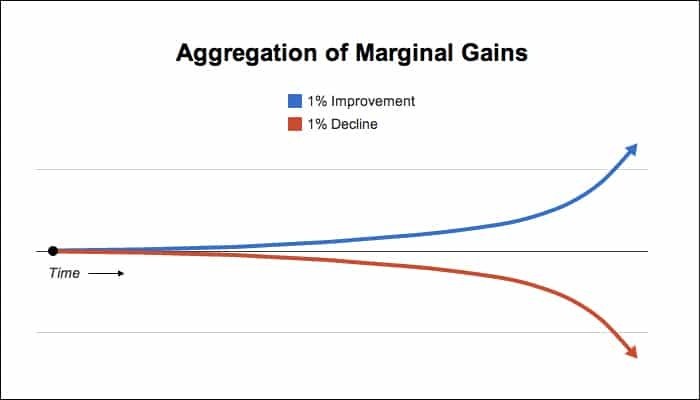your journey
Principle of Marginal Gains – Coach Improves Everything By One Percent
In 2010, Dave Brailsford faced a tough job. No British cyclist had ever won the Tour de France, but as the new General Manager and Performance Director for Team Sky (Great Britain’s professional cycling team), Brailsford was asked to change that.
His approach was simple.
Brailsford believed in a concept that he referred to as the “Aggregation of marginal gains.” He explained it as “The one percent margin for improvement in everything you do.” His belief was that if you improved every area related to cycling by just one percent, then those small gains would add up to remarkable improvement.
They started by optimising the things you might expect: the nutrition of riders, their weekly training program, the ergonomics of the bike seat, and the weight of the tires.
Brailsford and his team didn’t stop there. They searched for one percent improvements in tiny areas that were overlooked by almost everyone else: discovering the pillow that offered the best sleep and taking it with them to hotels, testing for the most effective type of massage gel, and teaching riders the best way to wash their hands to avoid infection. They searched for one percent improvements everywhere.
Brailsford believed that if they could successfully execute this strategy, then Team Sky would be in a position to win the Tour de France in five years time. He was wrong. They won it in three years.
In 2012, Team Sky rider Sir Bradley Wiggins became the first British cyclist to win the Tour de France. That same year, Brailsford coached the British cycling team at the 2012 Olympic Games and dominated the competition by winning 70 percent of the gold medals available.
In 2013, Team Sky repeated their feat by winning the Tour de France again, this time with rider Chris Froome. Many have referred to the British cycling feats in the Olympics and the Tour de France over the past 10 years as the most successful run in modern cycling history.
And now for the important question: What can we learn from Brailsford’s approach?
The Aggregation of Marginal Gains
Almost every process and habit you have — good or bad — is the result of many small decisions over time.
So often we convince ourselves that change is only meaningful if there is some large, visible outcome associated with it. Whether it is losing weight, building a business, travelling the world or any other goal, we often put pressure on ourselves to make some earth-shattering improvement that everyone will talk about.
Meanwhile, improving by just one percent isn’t notable (and sometimes it isn’t even noticeable) but it can be just as meaningful, especially in the long run.
From what we can tell, this pattern works the same way in reverse (an aggregation of marginal losses, in other words.) If you find yourself stuck with bad habits or poor results, it’s usually not because something happened overnight. It’s the sum of many small choices — a one percent decline here and there — that eventually leads to a problem.
In the beginning, there is basically no difference between making a choice that is one percent better or one percent worse. In other words, it won’t impact you very much today but, as time goes on, these small improvements or declines compound and you suddenly find a very big gap between companies who make slightly better decisions and those who don’t. This is why small choices don’t make much of a difference in the short-term but add up over the long-term.
The Bottom Line
You probably won’t find yourself in the Tour de France anytime soon, but the concept of aggregating marginal gains can be used all the same.
Most people love to talk about success (and life in general) as an event. We talk about losing fifty pounds or building a successful business or winning the Tour de France as if they are events. But the truth is that most of the significant things in life aren’t stand-alone events, but rather the sum of all the moments when we chose to do things one percent better or one percent worse. Aggregating these marginal gains makes a difference.
There is power in small wins and slow gains. This is why average speed yields above average results. This is why the system is greater than the goal.
This story is the basis of our Run Better improvement programme. We make sure small measurable gains to your SAP system, resulting in better and faster processing. The sum of which, when scaled to the enterprise, result in large savings for your business. Contact us for more information on how we can help you save time and money using your SAP solution.
Share this:

Neil ran his first SAP transformation programme in his early twenties. He spent the next 21 years working both client side and for various consultancies running numerous SAP programmes. After successfully completing over 15 full lifecycles he took a senior leadership/board position and his work moved onto creating the same success for others.